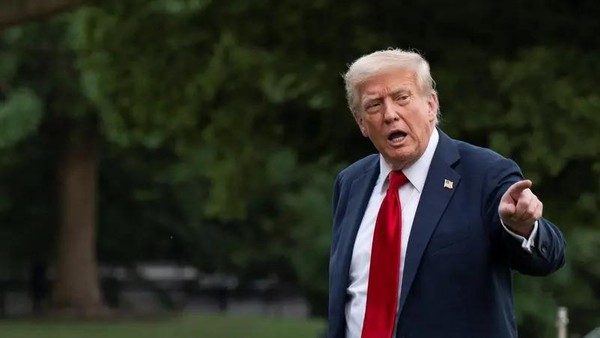seniorspectrumnewspaper – US President Donald Trump has threatened to impose tariffs and export restrictions on countries that target American technology firms with digital taxes and regulations. In a statement posted on his Truth Social platform. Trump accused foreign governments of crafting discriminatory legislation designed to harm US companies like Google, Meta, Amazon, and Apple.
Read More : Donald Trump Hopes to Meet Kim Jong-un, Mentions US Land
Trump specifically called out measures such as the United Kingdom’s digital services tax (DST). Which imposes a 2% levy on revenues generated by large global tech firms. This tax, introduced in 2020, raises around £800 million annually for the UK. According to Trump, such taxes unfairly target US companies while “giving a complete pass” to China’s major tech firms.
He warned that unless these digital taxes and related regulations are repealed. His administration would respond with “substantial additional tariffs” on exports from the countries imposing them. He also threatened export restrictions on critical US technologies and chips, signaling a potential escalation in trade tensions.
The move places pressure on allies such as the UK and the European Union. Both of which recently struck trade agreements with the United States. While the EU has introduced broad regulatory frameworks like the Digital Services Act to rein in tech monopolies. Individual member states such as France, Italy, and Spain have also enacted their own digital tax regimes.
US officials have repeatedly voiced concerns about these policies. In February, Trump signed an executive order titled Defending American Companies and Innovators from Overseas Extortion and Unfair Fines and Penalties, which included the possibility of retaliatory tariffs.
Global Response and Growing Tensions Over Digital Trade Policy
Trump’s stance has reignited debate over the future of digital taxation and international trade norms. In April, reports emerged that UK Prime Minister Keir Starmer had quietly offered a reduced DST rate to major US tech companies to ease Trump’s concerns. However, the UK continued to apply the tax to other non-US tech firms, raising questions about fairness and consistency.
This week, Trump reaffirmed his hardline position, stating: “America, and American technology companies, are neither the ‘piggy bank’ nor the ‘doormat’ of the world any longer.” He urged countries to “show respect to America and our amazing tech companies or consider the consequences.”
The warning followed a joint US-EU statement pledging to address “unjustified trade barriers.” However, the EU later clarified it had not committed to altering any of its digital regulations. Meanwhile, Canada recently scrapped its proposed DST, which Trump had earlier labeled a “direct and blatant” attack on US businesses. The decision was widely viewed as a concession aimed at improving trade relations with the US.
Read More : South Korea Denies U.S. Stake Rumors in Chip Firms
In the UK, political leaders pushed back. Liberal Democrat leader Ed Davey called on the government to resist what he described as Trump’s “bullying.” He warned against weakening Britain’s DST, arguing that wealthy tech executives already profit enormously from user data and have little incentive to protect online safety.
As Trump signals a tougher approach to global digital tax policies, countries must now weigh the benefits of taxation against the risks of triggering a trade war. With tensions rising and economic stakes high, the digital tax debate may soon become a defining issue in international trade relations.


